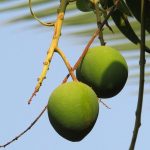The African mango, also known as Irvingia gabonensis, is a nutritional powerhouse native to the rainforests of West and Central Africa. It has gained immense popularity in recent years due to its impressive health-promoting properties, including weight loss, improved cholesterol levels, and blood sugar control.
**Nutritional Profile**
African mangoes are a rich source of essential vitamins, minerals, and antioxidants. They are particularly high in fiber, which helps promote satiety and regulate digestion. Additionally, they contain healthy fatty acids, protein, and vitamins A, C, and E.
**Weight Loss**
One of the most notable benefits of African mango is its role in weight management. Studies have shown that consuming African mango extract can help suppress appetite, increase metabolism, and promote fat burning. Its high fiber content creates a feeling of fullness, reducing the desire to overeat.
**Improved Cholesterol Levels**
African mango has been found to have a positive impact on cholesterol levels. It helps raise HDL (good) cholesterol while lowering LDL (bad) cholesterol. This is achieved through its ability to reduce triglycerides, a type of fat that can accumulate in the blood and contribute to heart disease.
**Blood Sugar Control**
African mango is also beneficial for individuals with blood sugar imbalances. It contains compounds that slow down the absorption of glucose into the bloodstream, helping to regulate blood sugar levels. This makes it a potential dietary supplement for people with type 2 diabetes.
**Other Potential Benefits**
In addition to the aforementioned benefits, African mango has also been linked to several other health advantages, including:
* **Anti-inflammatory properties:** African mango contains antioxidants that can help reduce inflammation throughout the body.
* **Improved immune function:** Its high vitamin C content supports a healthy immune system.
* **Antioxidant activity:** African mango is a rich source of antioxidants that protect cells from damage caused by free radicals.
* **Reduced risk of certain cancers:** Some studies suggest that the antioxidants in African mango may have potential anti-cancer properties.
**How to Consume African Mango**
African mango can be consumed in a variety of ways:
* **Fresh fruit:** The ripe fruit can be eaten as is or added to salads, smoothies, and desserts.
* **Dried fruit:** Dried African mango pieces are a convenient and portable snack.
* **Extract:** African mango extract is available in capsule or liquid form and can be taken as a dietary supplement.
**Dosage and Safety**
The recommended dosage of African mango extract varies depending on the individual and the desired outcome. It is generally recommended to start with 150-300 mg per day and gradually increase the dose as needed. African mango is generally considered safe for most people, but it is important to consult with a healthcare professional before taking it, especially if you have any underlying health conditions or are taking any medications.
In conclusion, African mango is a remarkable superfruit with a wide range of health benefits. Its ability to promote weight loss, improve cholesterol levels, regulate blood sugar, and provide other health advantages makes it a valuable addition to a healthy diet and lifestyle.

